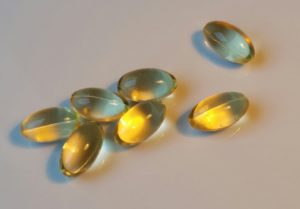 Several recent articles on Medscape (a site for medical professionals) highlight the debate over vitamin D. The question: Does daily vitamin D supplementation have positive health benefits or not? Everyone agrees that if there is an actual deficiency, then it has positive health effects. But how about the average person with levels above the deficiency level?
Several recent articles on Medscape (a site for medical professionals) highlight the debate over vitamin D. The question: Does daily vitamin D supplementation have positive health benefits or not? Everyone agrees that if there is an actual deficiency, then it has positive health effects. But how about the average person with levels above the deficiency level?
Numerous observational studies find that low levels of vitamin D are associated with all sorts of health problems (e.g., cancer, heart disease), but randomly controlled trials (RCT) where people are randomly assigned to different groups with no one knowing what they are getting - just aren't finding health benefits. The strongest evidence so far has been for vitamin D supplementation resulting in lower incidence of upper respiratory illnesses.
What is going on? Some suggest that low vitamin D levels are a marker for ill health (the illness reduces the vitamin D levels), and that vitamin D levels go down when there is chronic inflammation. It could also be a proxy for sun exposure (the more sunlight, the higher the vitamin D levels). Note that sunlight may have additional benefits compared to just vitamin D supplementation (e.g, blue light is immune boosting).
John M. Mandrola, MD writes for Medscape, and his articles tend to be thought-provoking. Some excerpts of a Commentary by Dr. John Mandrola from Medscape: Why Is Vitamin D Hype So Impervious to Evidence?
The vitamin D story exudes teaching points: it offers a master class in critical appraisal, connecting the concepts of biologic plausibility, flawed surrogate markers, confounded observational studies, and slews of randomized controlled trials (RCTs) showing no benefits on health outcomes.
Yet despite the utter lack of benefit seen in trials, the hype continues....
My questions are simple: Why doesn't the evidence persuade people? How many nonsignificant trials do we need before researchers stop studying vitamin D, doctors stop (routinely) measuring levels, and patients stop wasting money on the unhelpful supplement? What are the implications for this lack of persuasion?
Before exploring these questions, I want to set out that symptomatic vitamin deficiencies of any sort ought to be corrected.
Biologic Plausibility and the Pull of Observational Studies
It has long been known that vitamin D is crucial for bone health and that it can be produced in the skin with sun exposure. In the last decade, however, experts note that nearly every tissue and cell in our body has a vitamin D receptor. It then follows that if this many cells in body can activate vitamin D, it must be vital for cardiovascular health, immune function, cancer prevention: basically, everything health-related.
Oodles of observational studies have found that low serum levels of vitamin D correlate with higher mortality from all causes, cancer, cardiovascular disease, and now even COVID-19. Yet no matter the amount of statistical adjustment in these studies, we cannot know whether these associations are due to true causality.
The major issue is confounding: that is, people with low vitamin D levels have other conditions or diseases that lead to higher rates of ill health. Consider a patient with obesity, arthritis, and cognitive decline; this person is unlikely to do much exercise in the sun and may have low vitamin D levels. The low vitamin D level is simply a marker of their overall poor health.
The Randomized Controlled Trials Tell a Clear Story
There are hundreds of vitamin D RCTs. The results simplify into one sentence: Vitamin D supplements do not improve health outcomes.
Here is a short summary of some recent studies.
VITAL, a massive (N > 25,000) RCT with 5 years of follow-up, compared vitamin D supplements to placebo and found no differences in the primary endpoints of cancer or cardiac events. Rates of death from any cause were nearly identical. Crucially, in subgroup analyses, the effects did not vary according to vitamin D levels at baseline.
The D-Health investigators randomly assigned more than 21,000 adults to vitamin D or placebo and after 5.7 years of follow-up reported no differences in the primary endpoint of overall mortality. There were also no differences in cardiovascular disease mortality.
There were also no significant differences in terms of mortality from cardiovascular disease, cancer, or other causes. Rates of total adverse events between the two groups, including hypercalcemia and kidney stones, were similar.
He ends with: The norm would be that pills, supplements, and procedures are not what delivers good health. What delivers health is an amalgam of good luck, healthy habits, and lots of time spent outside playing in the sun.
This the D-Health study (21,000+ persons aged 60 and older, followed for 5.7 years) that Dr. Mandrola refers to that found no benefits from monthly vitamin D supplementation. From Medscape: Vitamin D Shows No Survival Benefit in Nondeficient Elderly
Monthly supplementation with vitamin D3 (cholecalciferol) in older adults without deficiency has no significant benefit in terms of survival outcomes, including mortality linked to cardiovascular disease, new results from a large, placebo-controlled trial show.
"The take-home message is that routine vitamin D supplementation, irrespective of the dosing regimen, is unlikely to be beneficial in a population with a low prevalence of vitamin D deficiency," first author Rachel E. Neale, PhD, of the Population Health Department, QIMR Berghofer Medical Research Institute, in Brisbane, Australia, told Medscape Medical News.
